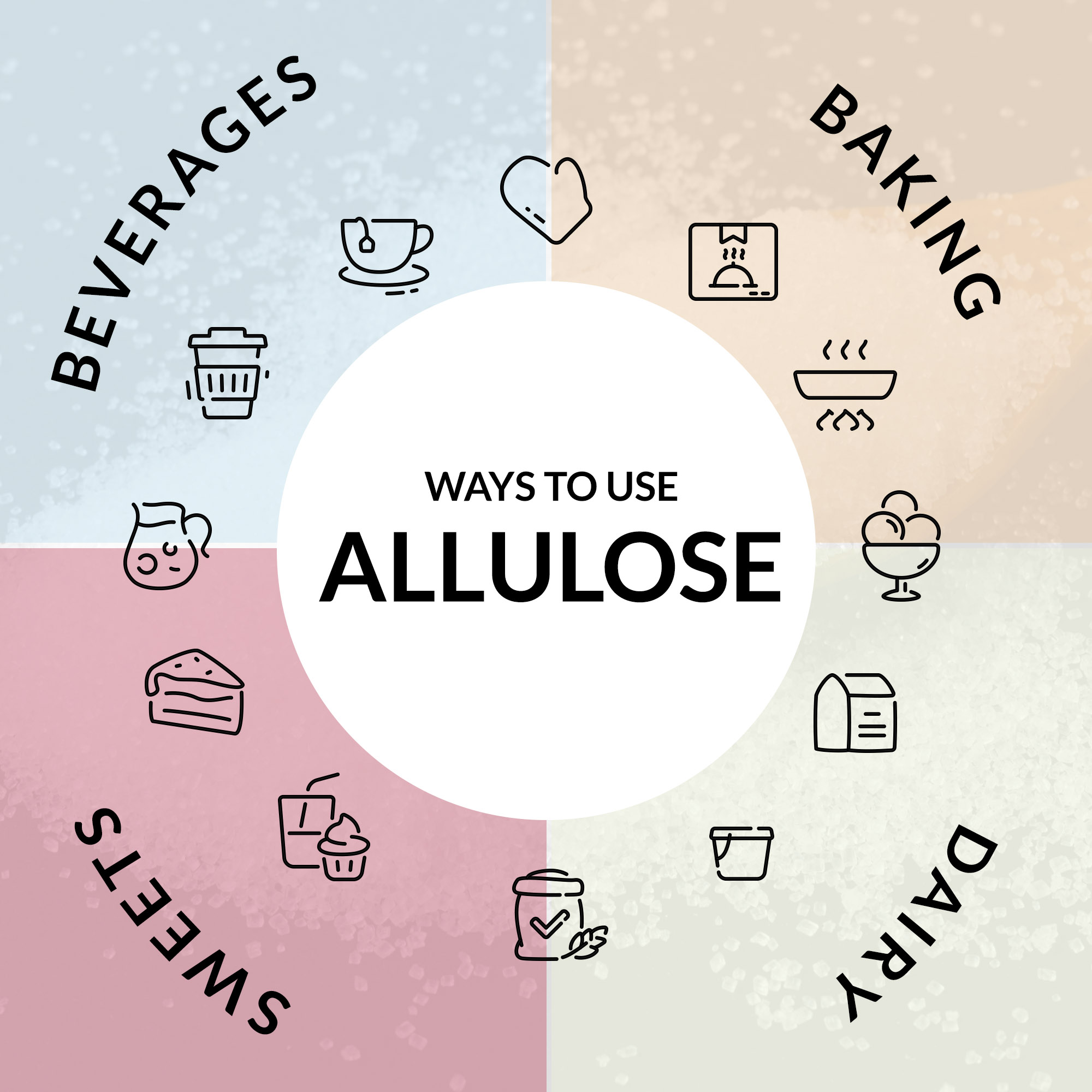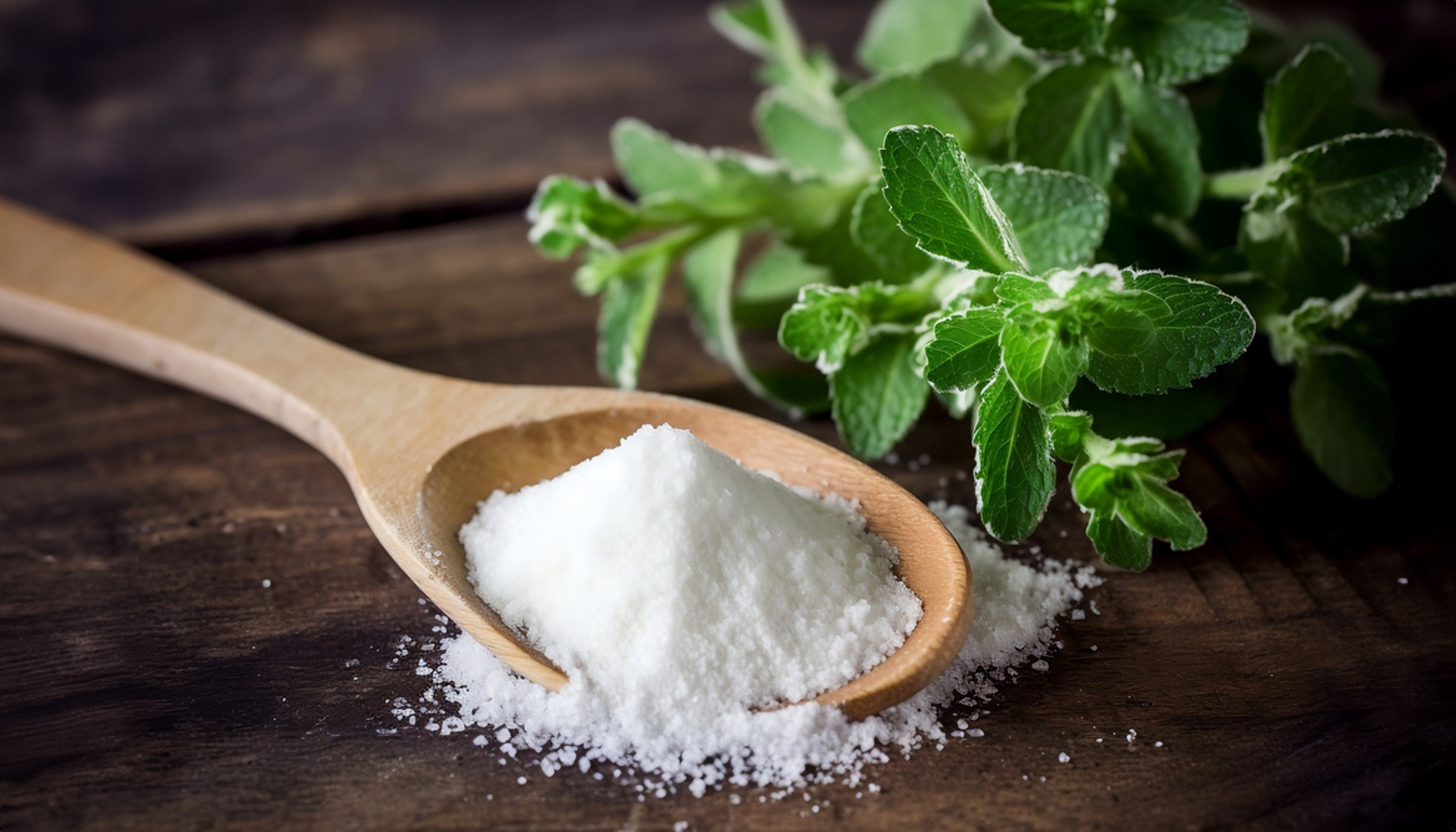Allulose is a keto-friendly sweetener that is rapidly gaining popularity due to its potential health benefits and great taste. Read on to learn all about allulose, its health effects, and practical tips for including it in your ketogenic lifestyle if it sounds like a good fit for you.
What Is Allulose?
Allulose (D-allulose or D-psicos) is an isomer of fructose (D-fructose). Isomers are molecules that share the same molecular formula but differ in the way their atoms are arranged. Although allulose is chemically very similar to fructose, your body is unable to process it in the same way. Approximately 70% of allulose is absorbed in the small intestine and then excreted in urine without being metabolized. The remaining 30% is fermented into short-chain fatty acids in the colon. The result is that allulose provides about 0.4 calories per gram – 1/10 the calories of sucrose (table sugar) – and zero carbs.
It’s classified as a “rare sugar” that’s approximately 70% as sweet as sucrose and nearly identical in taste.
Is allulose a “natural” sugar? Yes and no. Allulose could be described as “natural” because it’s found in foods like raisins and figs in tiny amounts. However, the allulose sold in stores and online is produced by enzymatically converting fructose from corn or beet sugar into allulose.

What Are the Potential Health Benefits of Using Allulose?
Emerging research suggests that allulose can provide some impressive metabolic health benefits, including:
- Lower blood glucose levels: Results from multiple randomized trials show that blood glucose (and insulin, when it was measured) in healthy people and those with diabetes tends to decrease in response to allulose consumption. Researchers believe this may be due to a combination of factors, such as inhibiting sugar absorption in the small intestine, promoting glycogen synthesis in the liver, and protecting pancreatic beta cells. And although we don’t yet have any published research on allulose’s effects in people with type 1 diabetes, several people living with this condition who follow a low-carb lifestyle have reported that their blood glucose remains stable or decreases after consuming allulose.
- Increased satiety: In a 2022 randomized trial, allulose was found to trigger the release of the satiety hormones GLP-1, CCK, and PYY, which promote fullness and help reduce hunger. Several animal studies have also found that allulose increases GLP-1 levels, along with improving metabolic health markers.
- Potential loss of body fat: A 2017 randomized crossover trial of 13 healthy adults found that a single dose of allulose significantly increased post-meal fat oxidation and decreased plasma glucose levels compared to a control sweetener (aspartame). In a much larger 12-week randomized trial of 121 adults, participants who consumed allulose experienced significant reductions in subcutaneous body fat compared to participants in the control (sucralose) group. Animal studies have also shown loss of body fat in response to consuming allulose.
Although more studies on allulose are needed, the existing research for this sweetener is very promising!
Are There Any Drawbacks of Using Allulose?
- Gastrointestinal Issues: Consuming large amounts of allulose can lead to gastrointestinal symptoms, such as bloating, abdominal discomfort, gas, and diarrhea. A small study found that limiting allulose consumption to about 20-30 grams at a time and 40 grams per day prevented these issues. For reference, 12 grams of allulose is approximately 1 tablespoon. However, keep in mind that individual tolerance may vary.
- Cost and availability: Allulose is currently more expensive than traditional sugars and many other sweeteners, which may limit its widespread use. In addition, it isn’t available for purchase in every country.
- Sweet taste: Some people may find that using sweeteners – even “natural” types like allulose or stevia – triggers sugar or carb cravings. Others might discover that they can’t stop at “just one” keto brownie, cookie, or treat. For those who have these responses, avoiding all sweets – keto-friendly or not –is the best way to go.
- Individual sensitivities: Since allulose is a relatively new sweetener it’s possible that, like other sugar substitutes, some people may experience sensitivities to it that haven’t yet been identified.

Ways to Use Allulose
Because allulose tastes so much like sugar, does not raise blood glucose, and provides potential health benefits, it’s a great option for ketogenic lifestyles. It can be used in a variety of applications, including:
- Beverages: Allulose sweetens drinks like coffee, tea, and soft drinks without adding carbs.
- Baking and cooking: Allulose can be used in place of sugar in many recipes, although some adjustments may be needed due to its unique properties (See the next section for tips).
- Dairy products: A spoonful of allulose adds a touch of sweetness to plain yogurt. In addition, since it freezes well, it’s ideal for making ice cream.
- Confectionery: Allulose is an excellent sweetener for chocolates, candy, and similar treats.
Tips for Baking with Allulose
When it comes to baking, allulose offers some distinct advantages but also some challenges. Here are our tips for getting the best results.
- Browning and caramelization: Allulose browns and caramelizes faster than regular sugar, which is ideal for achieving a golden color in baked goods. However, this also means that baked items need to be monitored closely to prevent burning. Covering the dessert with foil for the final 5 to 10 minutes in the oven can help prevent excessive browning.
- Texture: Baked goods made with allulose often have a softer, moister texture. This can be advantageous when substituting it for sugar in some recipes, but it might not provide the same structural integrity as sugar in others. Adding half a teaspoon of ground psyllium husk or inulin may help firm up the texture of muffins and similar baked goods
- Sweetness adjustment: Since allulose is about 70% as sweet as sucrose, you can combine allulose with another sugar substitute, such as monk fruit, to achieve a sweeter taste. However, using allulose on its own can be a great way to enjoy desserts with a more subtle sweetness.
Purchasing Allulose
Allulose is sold online, in grocery stores, and in big box stores like Walmart. We like the RxSugar allulose product line, which includes granulated sweetener, syrups in multiple flavors, and their popular Swealthy Snax bars. You can purchase RxSugar products in our MyMojoMarket and save 20% on every order.
Key Takeaways
Allulose is a sugar substitute with a range of potential health benefits, including improved blood glucose levels and possible body fat reduction. Enjoy its unique properties and great taste in baking and in frozen desserts. Remember to use allulose in moderation to avoid digestive discomfort. Consider whether including sweetened foods in your diet is the best option for you. And rest assured that, based on published research and anecdotal reports, allulose is a keto-friendly choice if you’re looking for a healthy way to enjoy sweetness.



